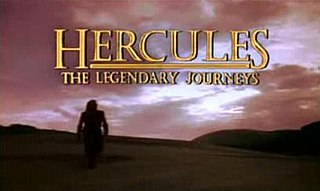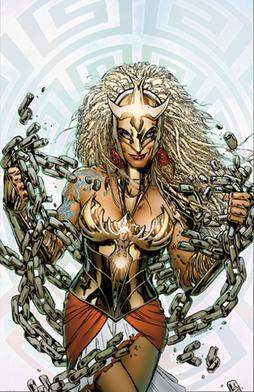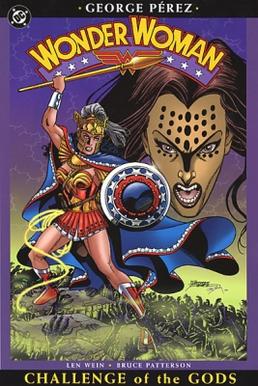Plot
Three men are walking through the woods, they hear strange noises and catch glimpses of something moving in the undergrowth. Suddenly they are attacked by unseen creatures. Two men are killed, but one escapes and flees the woods.
Hercules strolls into a village after returning from one of his adventures, and is greeted by Iolaus. It is established that Iolaus is getting married and that Hercules is the best man. The two men set off for Alcmene's house. While walking through the woods, they reminisce that it has been a long time since they last saw each other. Iolaus tells Hercules about his bride-to-be, Ania. They stumble upon a little girl crying alone near an altar. She tells them that a monster killed her father while they were placing an offering to the goddess. Hercules tries to comfort the girl and asks if he can help, but the girl transforms into a monster. Hercules chops off its head, and thinking it is now dead, he and Iolaus begin walking away. They hear a noise and turn around to see that the monster is not dead, and has now grown two new heads in the place where the previous one was. The monster is a Hydra. Hercules tells Iolaus to grab the torch from the altar, Hercules cuts off the heads and burns the Hydra, preventing it from growing new heads, thus killing it. After the Hydra is destroyed a peacock feather remains in its place, and Hercules tells Iolaus that Hera is responsible for the Hydra.
Hercules and Iolaus finally reach his mother's house. Iolaus invites them both for dinner, then leaves. While the four are enjoying dinner, Ania glimpses a man outside the window and Hercules goes to investigate. It is the Gargarean Pithus, the man who escaped the creatures at the beginning of the film. He explains to Hercules about his village being attacked by creatures and Hercules agrees to help. Iolaus persuades Hercules to let him go along for one last adventure before he is married, Hercules reluctantly relents and says that he can come along. The three men set off for the village. When they arrive Hercules asks where all the women are, Pithus tells him that they were stolen by the creatures in the forest. Hercules and Iolaus head off to find the beasts and rescue the village's women. In the forest they are ambushed by the beasts, managing to stave off the attack for a time until Iolaus discovers that the beasts are really women. He chases after one but is fatally injured in the fight, and dies in Hercules' arms. Hercules is then surrounded by several of the 'beasts'. Two of them approach him with spears. One of the 'creatures' cries out and says "No stop!", and then raises her mask. It happens to be a woman, who then says "The queen will want to kill him". Hercules is in utter shock to discover the true nature of the 'beasts'.
Hercules is then seen being taken captive by the women, bound in chains and gagged with a black leather strap. He is surrounded by the "Amazon Women Warriors" and led through the village full of women. An older woman offers to buy Hercules and several taunt him along the way to see the queen. When he arrives Hippolyta tells him that she knows he is here to defeat them. Hercules tells her she is wrong. Using a magic candle, Hippolyta turns Hercules into a baby telling him she will show him what he is really like. As Hercules reverts to infant form we are shown flashbacks to Hercules's youth and times when he has been told by people how to behave toward women. Later he returns to adult state, realizing that Hippolyta is right and that his attitude toward women is wrong, he tells her that he can change. She says that he cannot change and that all men are the same. Hippolyta goes to consult with Hera, she tells Hippolyta to lead an attack on the village.
Hercules escapes from the Amazons and warns the men of the village of the forthcoming attack. He prepares them for when the women arrive. The women ride into the village and order the men to remove their clothes, telling them they are here for only one thing. The men tell the women to sit and talk with them for a while. Pithus's wife enters her home, and her son Franco asks if she really is his mother. He tells her he often dreams about her but she has no face, she removes her mask and shows her face to Franco. Hercules stands up to Hippolyta, who says she's not afraid of Hercules. He kisses her, she tells him she is not afraid and kisses him back. The two make love. The following day the women are still with the men. The Amazons return to their city and both men and women reminisce about the night before. Hera tells Hippolyta that Hercules has tricked her and orders her to attack the village again, this time killing all the men and boys. Hippolyta refuses but Hera possesses her. Hera, now in control of Hippolyta's actions, orders the women to attack the village.
Hercules stops Hippolyta and realizes that she is possessed by Hera. She rides off and Hercules goes after her. As they fight Hercules tries to get through to Hippolyta, telling her that she is stronger than Hera and to fight her control, but it proves futile. Pithus then arrives to aid Hercules, preventing Hera from striking a killing blow to him. She grabs Pithus and holds a knife to his throat. Despite Hercules’s plea, Hera cuts Pithus’s throat, which ignites Hercules’s fury enough to best her. Hercules is about to deal the fatal blow, but stops as he realises he would be killing Hippolyta, not Hera. Hercules flees, but Hera follows, goading him, and eventually cornering him at the top of a large waterfall. He tells Hera that if he or Hippolyta has to die then he will give up his life for her, saying he could not live his life without her. Upon hearing this Hera runs Hippolyta's body over the edge of the waterfall, killing her.
Hercules returns to the City of Amazons and retrieves the candle Hippolyta used to send him back to his childhood. Zeus appears and tells him the candle does not work in the way Hercules wants it to. Hercules replies that Zeus could make it work that way. Zeus tells Hercules that if he did that he would be in big trouble with Hera, but Hercules persuades him anyway. Zeus blows out the candle and Hercules is taken back to the night of the dinner. Ania sees Pithus outside the window and Hercules goes to tell him that the village does not need his help. He explains that all the men need to do is treat the women with respect and things will sort themselves out. Pithus returns to the village and when the women come the men sort out the problems that have been occurring. Alcmene asks Hercules if there is a woman out there who will make him happy like Ania did for Iolaus, and Hercules replies that he is sure there is as he thinks about Hippolyta.

In Greek mythology, Eurystheus was king of Tiryns, one of three Mycenaean strongholds in the Argolid, although other authors including Homer and Euripides cast him as ruler of Argos.

Heracles, born Alcaeus or Alcides, was a divine hero in Greek mythology, the son of Zeus and Alcmene, and the foster son of Amphitryon. He was a descendant and half-brother of Perseus. He was the greatest of the Greek heroes, the ancestor of royal clans who claimed to be Heracleidae (Ἡρακλεῖδαι), and a champion of the Olympian order against chthonic monsters. In Rome and the modern West, he is known as Hercules, with whom the later Roman emperors, in particular Commodus and Maximian, often identified themselves. Details of his cult were adapted to Rome as well.

Hercules: The Legendary Journeys is an American television series filmed in New Zealand, based on the tales of the classical Greco-Roman culture hero Heracles. Starring Kevin Sorbo as Hercules and Michael Hurst as Iolaus, it was produced from January 16, 1995, to November 22, 1999. It ran for six seasons, producing action figures and other memorabilia as it became one of the highest-rated syndicated television shows in the world at that time. It has aired on Once Channel, Sky1, five/5, Heroes & Icons, and Horror.

The Lernaean Hydra or Hydra of Lerna, more often known simply as the Hydra, is a serpentine water monster in Greek mythology and Roman mythology. Its lair was the lake of Lerna in the Argolid, which was also the site of the myth of the Danaïdes. Lerna was reputed to be an entrance to the Underworld, and archaeology has established it as a sacred site older than Mycenaean Argos. In the canonical Hydra myth, the monster is killed by Heracles (Hercules) as the second of his Twelve Labors.

Jason and the Argonauts is a 1963 independent fantasy adventure film distributed by Columbia Pictures. It was produced by Charles H. Schneer, directed by Don Chaffey, and stars Todd Armstrong, while co-starring Nancy Kovack, Honor Blackman, and Gary Raymond.

The Labours of Hercules or Labours of Heracles are a series of tasks carried out by Heracles, the greatest of the Greek heroes, whose name was later romanised as Hercules. They were accomplished in the service of King Eurystheus. The episodes were later connected by a continuous narrative.

Themyscira is a fictional unitary sovereign city-state and archipelagic island nation appearing in American comic books published by DC Comics. Previously known as Paradise Island and the Amazon Isles, it first appeared in All Star Comics #8.

Queen Hippolyta is a superhero appearing in American comic books published by DC comics, based on the Amazon queen Hippolyta from Greek mythology. Introduced in 1941 during the Golden Age of Comic Books, she is the queen of the Amazons of Themyscira, the mother of Wonder Woman, and in some continuities, the adopted mother of Donna Troy.
Hercules is a 2005 American television miniseries chronicling the life of the legendary Greek hero, Heracles, called Hercules in this series. It is most often aired on television as a two-part miniseries: the first part documents his early life in Tiryns and his desire and marriage to the lady Megara; the second part follows the more widely recognised part of his life, in seeking redemption for the madness-induced murder of his family.

Hippolyta is a fictional Amazon character appearing in American comic books published by Marvel Comics. Created by Stan Lee and Jack Kirby, the character first appeared in Thor #127. Hippolyta is the daughter of Ares, the God of War.
Hercules in the Underworld is the fourth television movie in the syndicated fantasy series Hercules: The Legendary Journeys.
Hercules in the Maze of the Minotaur is the fifth and final television movie in the syndicated fantasy series Hercules: The Legendary Journeys.

Hercules is a fictional Olympian god in the DC Universe based on the Greek demigod and hero of the same name.

Hercules & Xena – The Animated Movie: The Battle for Mount Olympus is a 1998 American animated action-adventure direct-to-video film starring the voices of Kevin Sorbo, Lucy Lawless, Michael Hurst, Renee O'Connor, Kevin Smith and Alexandra Tydings, all reprising their roles from the 2 live-action/special effects television series, Hercules: The Legendary Journeys & Xena: Warrior Princess. In the film, Zeus' wife Hera releases the four Titans after eons of imprisonment in a fit of jealousy, prompting Hercules and Xena to join forces and stop her. The film was produced & directed by Lynne Naylor.

Typhon is a fictional character appearing in American comic books published by Marvel Comics. The character is most commonly associated with the hero Hercules. He is based on the legendary monster of the same name.

"Challenge of the Gods" was a seven issue comic book story arc written and drawn by George Pérez, with co-writing by Len Wein. It is the second arc of the Wonder Woman title that was, at the time, recently relaunched.

Zeus is a fictional deity in the DC Comics universe, an interpretation of Zeus from Greek mythology. His appearances are most significant in stories of Wonder Woman. With the 2011 relaunch of DC Comics dubbed The New 52, Zeus has received a prominent role in the Wonder Woman mythos, as he is now the biological father of Wonder Woman through Hippolyta.














